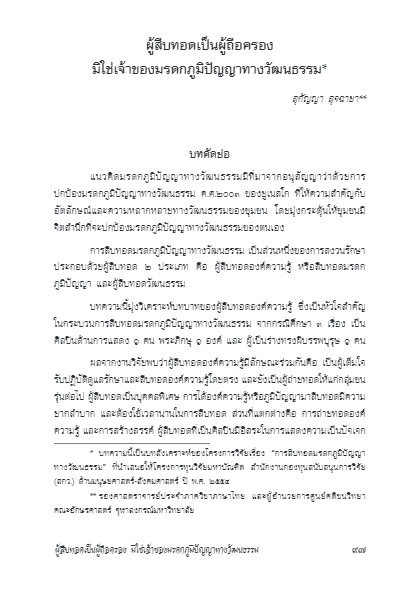สุกัญญา สุจฉายา
บทคัดย่อ
แนวคิดมรดกภูมิปัญญาทางวัฒนธรรมมีที่มาจากอนุสัญญาว่าด้วยการปกป้องมรดกภูมิปัญญาทางวัฒนธรรม ค.ศ.2003 ของยูเนสโก ที่ให้ความสำคัญกับอัตลักษณ์และความหลากหลายทางวัฒนธรรมของชุมชน โดยมุ่งกระตุ้นให้ชุมชนมีจิตสำนึกที่จะปกป้องมรดกภูมิปัญญาทางวัฒนธรรมของตนเอง
การสืบทอดมรดกภูมิปัญญาทางวัฒนธรรม เป็นส่วนหนึ่งของการสงวนรักษา ประกอบด้วยผู้สืบทอด 2 ประเภท คือ ผู้สืบทอดองค์ความรู้ หรือสืบทอดมรดก ภูมิปัญญา และผู้สืบทอดวัฒนธรรม
บทความนี้มุ่งวิเคราะห์บทบาทของผู้สืบทอดองค์ความรู้ ซึ่งเป็นหัวใจสำคัญในกระบวนการสืบทอดมรดกภูมิปัญญาทางวัฒนธรรม จากกรณีศึกษา 3 เรื่อง เป็นศิลปินด้านการแสดง 1 คน พระภิกษุ 1 องค์ และ ผู้เป็นร่างทรงผีบรรพบุรุษ 1 คน
ผลจากงานวิจัยพบว่าผู้สืบทอดองค์ความรู้มีลักษณะร่วมกันคือ เป็นผู้เต็มใจรับปฏิบัติดูแลรักษาและสืบทอดองค์ความรู้โดยตรง และยังเป็นผู้ถ่ายทอดให้แก่กลุ่มชนรุ่นต่อไป ผู้สืบทอดเป็นบุคคลพิเศษ การได้องค์ความรู้หรือภูมิปัญญามาสืบทอดมีความยากลำบาก และต้องใช้เวลานานในการสืบทอด ส่วนที่แตกต่างคือ การถ่ายทอดองค์ความรู้ และการสร้างสรรค์ ผู้สืบทอดที่เป็นศิลปินมีอิสระในการแสดงความเป็นปัจเจกเพียงแต่เป็นการสร้างสรรค์ภายในกรอบของขนบเดิม ส่วนผู้สืบทอดที่เป็นเจ้าพิธีมีการสร้างสรรค์น้อยกว่าหรืออาจไม่มีเลย เพราะต้องยึดตามขนบอย่างเคร่งครัด
แม้ผู้สืบทอดจะมีบทบาทสำคัญยิ่งต่อการสืบทอด แต่มิได้เป็นเจ้าของมรดกภูมิปัญญานั้นๆ เพราะมิได้มีสิทธิเชิงกฎหมาย จึงเป็นได้แต่เพียงผู้ถือครองภูมิปัญญาเท่านั้น
(ตีพิมพ์ใน วารสารไทยศึกษา ปีที่ 8 ฉบับที่ 2 (สิงหาคม 2555 – มกราคม 2556) หน้า 97-121)
The Transmitter of Traditional Knowledge is the Holder, Not the Owner
Sukanya Sujachaya
Abstract
The concept of Intangible Cultural Heritage (ICH) is derived from UNESCO’s Convention for the Safeguarding of the Intangible Cultural Heritage 2003, which emphasizes the identity and diversity of the culture of a community by encouraging consciousness in safeguarding their own cultural heritage. The transmission of ICH is a part of the preservation of ICH consisting of two kinds of holders: traditional knowledge holders and community culture holders.
This article focuses on the role of traditional knowledge holders, which are the core of the process of ICH’s transmission. Such roles are those of the three case studies: an artist, a Buddhist monk and an ancestral spirit medium. The research shows that both kinds of knowledge holders share a common characteristic – they are willing to preserve and hold the knowledge directly, as well as transmit such knowledge to the next generation. The holders are special people; their acquisition of knowledge is not easy and takes a long period in transmission.
However, it was also discovered that each of the two types of holders have some difference with each other. The difference concerns the aspects of knowledge transmission and the creativity of an artful holder who is free to express their individuality, but can only be created in the frame of old tradition. The holder who possesses knowledge on rites and ceremonies has little or no creativity because they have to adhere strictly to tradition and custom.
Although the knowledge holder has a crucial role in transmitting knowledge, they are not the owner of such knowledge because there is no legal right. Thus, they are always regarded as traditional knowledge holders.
(Published in Journal of Thai Studies Volume 8 Number 2 (August 2012 – January 2013) Page 97-121)
บทความ / Full Text : Download
